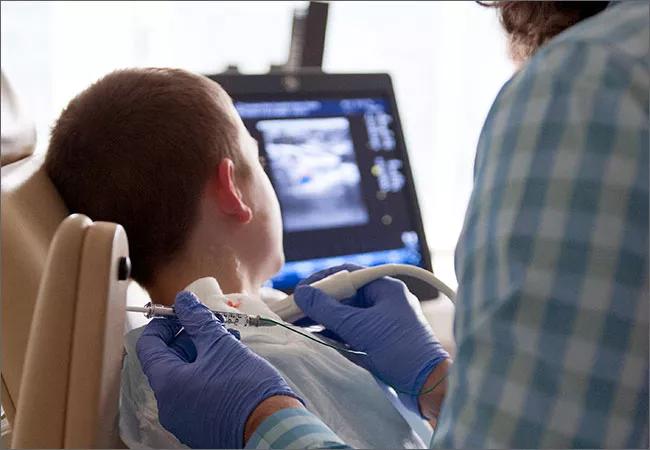A new specialty clinic for pediatric head and neck patients

Advertisement
Cleveland Clinic is a non-profit academic medical center. Advertising on our site helps support our mission. We do not endorse non-Cleveland Clinic products or services. Policy
As healthcare continues to more toward providing care for patient populations, our Pediatric Otolaryngology team at Cleveland Clinic Children’s has followed this model. In fall 2018, we were excited to expand our multidisciplinary clinic approach to the care of children with additional head and neck conditions with the launch of a new specialty program, the Head and Neck Oncology Pediatric Endocrine (HOPE) Center
This program is organized similarly to our longstanding clinics: the Pediatric Center for Airway, Voice and Swallowing Disorders (PCAVS) and the Pediatric Hearing Management Clinic.
Our programs focus on high-risk patients with specific medical issues and use a team approach to formulate individualized care plans. In these clinics, kids and their families meet with multiple providers during half-day or full-day appointments. For ease, patients and families are located in one appointment room for the day and our providers come to them. This setup is particularly helpful for kids in wheelchairs and with other mobility issues.
In 2018, we welcomed Rachel Georgopoulos, MD, who is leading the Head and Neck Oncology Pediatric Endocrine Center. In addition to providing care to pediatric cancer and thyroid disorder patients, she is conducting research on the prevention and cure of pediatric cancer and tumors. This new center is one step closer in creating a model where pediatric thyroid cancers are housed under one umbrella in Cleveland Clinic Children’s Cancer Program. We will work with Pediatric Hematology-Oncology to bring together all the necessary specialists, including radiation oncology, behavioral psychology, pediatric otolaryngology and pediatric endocrinology.
Advertisement
We are also developing standardized data collection within the electronic medical record as we follow our patients over time. We are working to create a template to track outcomes and patient data in a uniform way, by leveraging Epic smart data. The ultimate goal is to pool data into a registry to be shared with other medical centers so we can work together to improve patient care and research.
Established in 2009, PCAVS is an aerodigestive program that offers integrated team assessment and care for pediatric patients with complex medical conditions of the upper and lower airway and respiratory system, esophageal, swallowing and digestive issues, including patients with tracheostomies. Multiple medical and surgical specialists participate in the PCAVS. As head and neck surgeons, we place tracheostomies, perform airway reconstructions and upper airway procedures that can facilitate the eventual removal of a tracheostomy.
Pulmonologists are integral members of the team and, among other things, they facilitate getting patients off ventilators. Our gastroenterology colleagues evaluate for concomitant gastroesophageal pathology and assist in nutrition and feeding. The team also includes dietitians who manage nutrition and case workers who provide resources to patients and families with financial difficulty. We also work with our physical medicine and rehabilitation team as necessary.
Since it opened, the PCAVS has been able to significantly improve healthcare outcomes by decreasing technical direct cost by 70 percent and decreasing patient hospital days by about one week per year. This data was published in JAMA Otolaryngology–Head & Neck Surgery in October 2017.
Advertisement
Another one of our longstanding clinics, the Pediatric Hearing Management Clinic, directed by Samantha Anne, MD, similarly provides an interdisciplinary, comprehensive, family-centered approach to the evaluation and management of children with hearing loss. Specialists include pediatric otolaryngologists, speech-language pathologists and geneticists.
Patients include those with congenital deafness, unilateral or bilateral sensorineural hearing loss, auditory neural spectrum disorder, conductive hearing loss caused by aural atresia, microtia and ossicular abnormalities.
Taken together, our three clinics are designed to provide highly specialized care for these pediatric patient populations.
Dr. Hopkins is Section Head of Pediatric Otolaryngology and Surgical Director of the Aerodigestive (PCAVS) Clinic. Dr. Hopkins thanks Dr. Anne and Dr. Georgopoulos for their contributions to this article.
Advertisement
Advertisement

Analysis of HNSCC patients shows HPV status to be predictive of higher abundance of oncobacteria within the tumor

Case study illustrates the potential of a dual-subspecialist approach

Evidence-based recommendations for balancing cancer control with quality of life

Study shows no negative impact for individuals with better contralateral ear performance

HNS device offers new solution for those struggling with CPAP

Patient with cerebral palsy undergoes life-saving tumor resection

Specialists are increasingly relying on otolaryngologists for evaluation and treatment of the complex condition

Detailed surgical process uncovers extensive middle ear damage causing severe pain and pressure.